Hand washing and social distancing are key to prevent the coronavirus from spreading.
Imagine yourself living in a tight, designated space where you have to share one latrine together with tens or even hundreds of people. You also have to queue for water and food supplies.
You live with tens of thousands of people without a chance to avoid daily human contact and receive information that a highly contagious disease is spreading from human to human. You learn that this disease could require intensive care to save your life but you know that you and your family have practically no way of accessing any of the hospitals that can provide this care for you.
It is hard to even picture this scenario if you are not living as a refugee in one of the world’s crowded refugee camps or belong to the poorest section of a developing country’s population.
Currently, over 70 million people around the world have been forced to leave their homes because of conflicts, prolonged crises and disasters – 29 million of them live as refugees.
Most of these refugees – 84 per cent – live in low- or middle-income countries, like Uganda, Somalia, Kenya and Jordan where Finn Church Aid operates.
The World Health Organisation WHO declared the coronavirus epidemic a pandemic on March 11th. It means that the spread of the coronavirus from one country to another can no longer be stopped. Officials can only slow down the pandemic to avoid worst-case victim estimates.
Inequality shows even in hand hygiene
An essential part of slowing down the pandemic is maintaining sufficient hand hygiene and avoiding human contact. An unfortunate fact is that people do not have the same possibilities to even wash their hands with soap. This is a challenge for people already in a vulnerable position.
In places like refugee camps or slum areas, human contact is also hard if not impossible to avoid because they are densely populated areas. For instance, the world’s largest refugee camp Cox’s Bazar hosts 850,000 people on an area roughly the size of Chicago’s O’Hare International Airport.
By mid-March, Bangladesh had three coronavirus cases, but the number could be higher.
In refugee camps, latrines are often shared by a large number of people. Hygiene standards are poor already without an epidemic like the coronavirus. The poorest areas in developing countries face the same challenge.
The people forced to live in refugee camps have already experienced hardship and prolonged crisis conditions that can weaken their immune system. Many suffer from long-term illnesses that make them vulnerable to infections, and they ultimately form a risk group for the coronavirus.
While populations in Africa are generally young, sub-Saharan Africa is home to 68 per cent of the world’s 38 million HIV positive people. The coronavirus is a more severe threat to their already weaker immunity than it is to others of their age.
People in refugee camps do not have access to healthcare that corresponds to their needs. They particularly lack the intensive care facilities required to save lives from respiratory infections that the coronavirus can cause.
The world’s poorest and most vulnerable countries often suffer from a lack of proper health and sanitation services as well as clean water. These resources are at least not accessible for refugees.
Refugees might also be left without information about how to prevent infections from spreading.
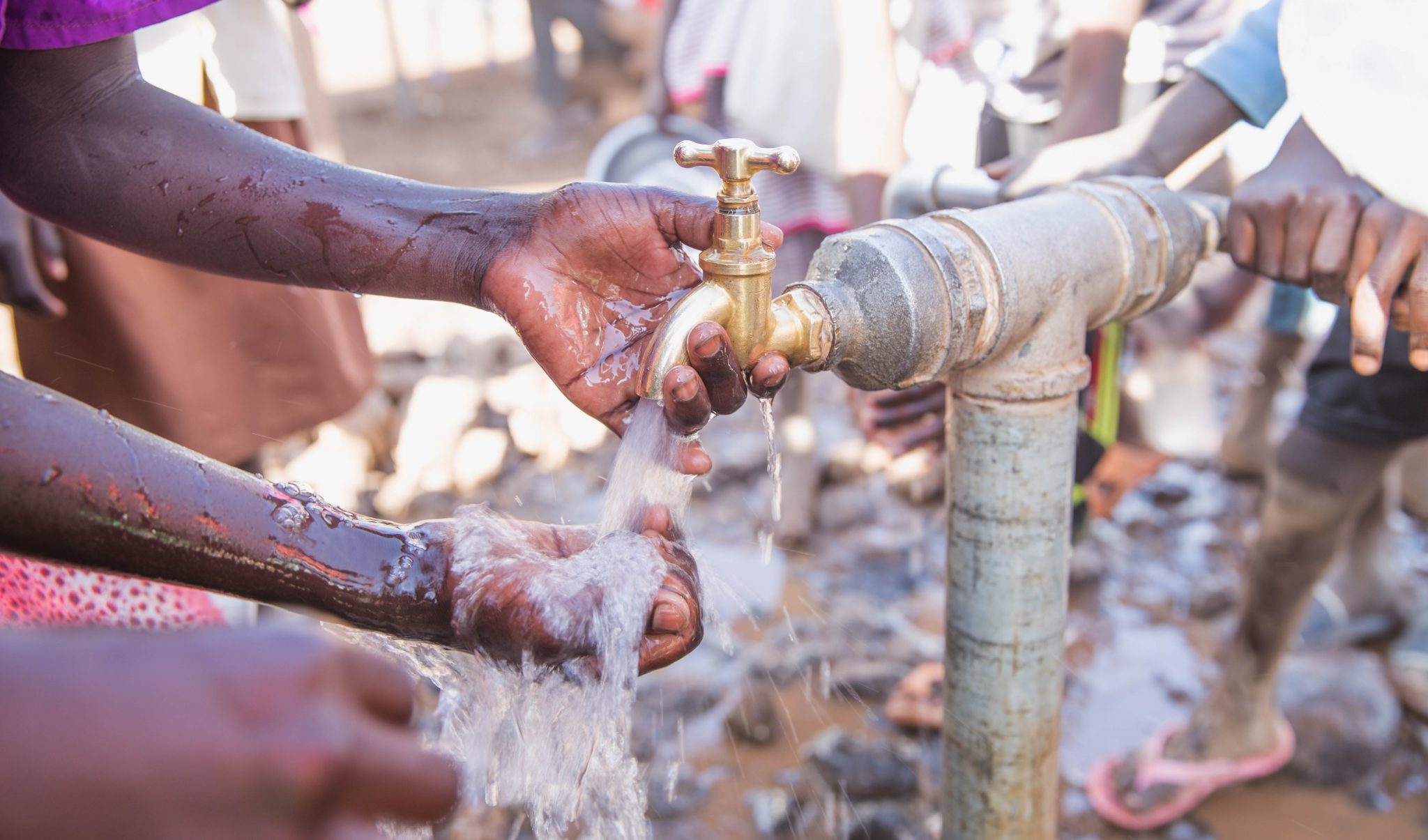
Hand washing prevents many kinds of infections but the possibility to wash hands with clean water and soap is not self-evident in the world’s poorest areas and refugee camps.
One can pass the disease to tens of others
The coronavirus is known to be highly contagious in social contacts, and also those without any symptoms can spread the virus in their surroundings. That is why social distancing – reducing the number of human contacts – is key to prevent the coronavirus from spreading.
Families are often big and family members stay close to each other in cramped spaces. One infected person could pass on the disease to the entire family – even three generations of it.
Small business owners are also highly vulnerable to the effects of the disease. People that depend on service- and retail-based livelihoods have to deal with other people. It exposes them to viral infections and they can also pass on the virus to a large number of people before any symptoms appear. When falling sick, they might lose the livelihood that supports their entire family.
The pandemic delays refugees’ access to safety
The pandemic creates an additional challenge for refugees: to stay where they are.
The UN’s refugee agency UNHCR is worried that the coronavirus pandemic can increase discrimination and racism towards refugees, even though the virus is more likely to spread with regular travellers from one part of the world to another.
There is still hope. In 2014-2015, West Africa suffered from the spread of the Ebola virus. It killed 11,000 people before the disease was contained. In addition to the death toll, Ebola caused severe economic losses to those already in a vulnerable position. But much worse could have happened.
Ebola spread mostly in fragile states like Liberia, Sierra Leone and Guinea. It also reached other countries but never spread widely on other continents.
The key to defeating the disease was that people received enough information and avoided contact with others.
Text: Elisa Rimaila
Translation: Erik Nyström
Picture: Carla Ladau
In Kenya’s poorest region, going to school requires great sacrifices, but David Edapal is convinced that education guarantees his daughter a good future.
There is a rustle of dry twigs as goats try to make their way out of their pen through narrow openings. 12-year-old Rebecca Atubo carefully guides baby goats into their own cage before letting the adult goats loose. Soon, the goats are ambling towards pastures in the gentle early-morning sun.
In a few hours, the temperature rises and turns to relentless heat, and it is hard to find shade in the desert-like environment.
”Herding is hard work when it’s so hot, and you’re thirsty all the time,” Rebecca describes.
Still, Rebecca is obedient and does what is asked of her.
For thousands of years, the nomadic people of Northwest Kenya have made their living raising cattle, and children have taken responsibility for the family’s goats and cows at a young age.
However, the distance to pastures has grown longer. There is no green in sight in the yellowish-gray landscape outside the family’s huts. Rebecca’s father David Edapal has been worried for a long time. He cannot say how old he is, but the lines on his face reveal he has seen several decades in Turkana, the poorest county in Kenya.
”The weather has grown warmer, and there are much fewer rains than before. In order to get water, we have to walk for two hours one way every day to get to the nearest river,” says Edapal.
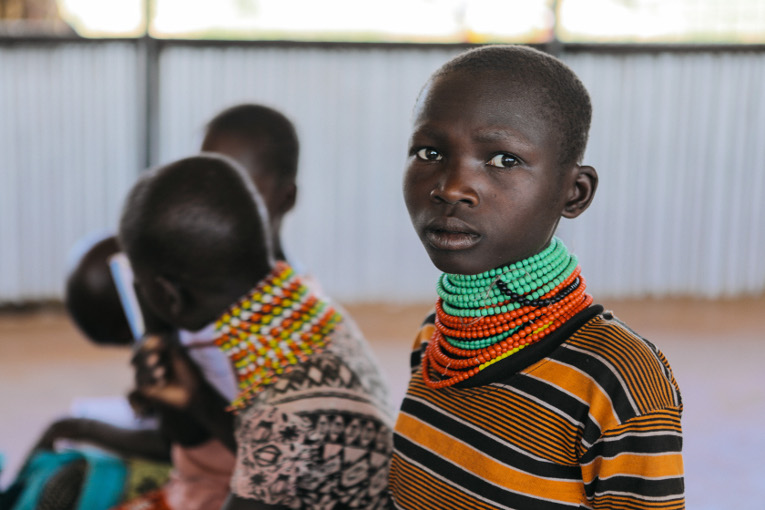
Rebecca says she prefers school to herding. Because of the heat, herding is hard work for both children and adults, and according to Rebecca, the thirst is the worst part.
Tested by drought
Severe periods of drought are testing Turkana more and more frequently. The drought in 2017 was the worst in decades. Hundreds of thousands of animals died due to lack of water as well as diseases.
This was a hard blow for the pastoralists, who traditionally move to follow the rains. Livestock are like a bank account on legs – they are used to fulfil all needs. Livestock provide milk and meat for food. Selling livestock brings in money to pay for things such as healthcare.
In addition, men need livestock to pay dowry to the family of the bride when they get married. The death of livestock hit families like an economic recession.
”Animals ravaged by drought cannot be sold or eaten, and they provide much less milk,” Edapal explains.
The crisis also fuels tensions among pastoralist people. They compete for the shrinking pastures, and extreme poverty makes stealing cattle a tempting prospect. A camel shepherd passing by carries an assault rifle on his shoulder to keep thieves at bay. Adding to the insecurity is a stream of firearms coming to Turkana across the border from neighbouring war-torn South Sudan.
For a pastoralist, questions about property are about as personal as asking a Finn about their salary. Most keep the number of livestock to themselves. However, Edapal reveals that cattle thieves took about two hundred of the family’s animals.
The family fled the insecurity into their current place of residence in the village of Ageles near the town of Lokichar. Edapal’s wife Aseken Namasi says all their hardships hurt her heart.
”The worst moment was when thieves killed four of my friends in front of my eyes when I was retrieving water,” she says. ”You can always get more livestock, but you can never replace a human being.”
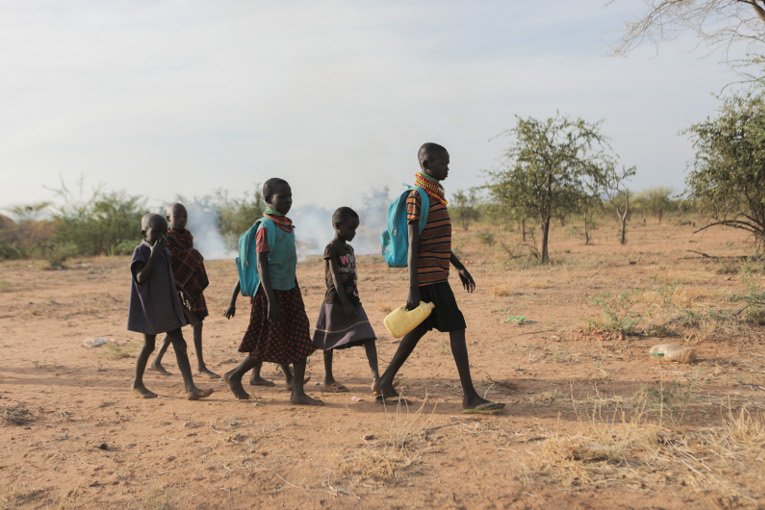
Rebecca Atubo, 12, (in front) walking to school with her friends. It is important to have the school close to home, as the journey to school is filled with danger in Turkana.
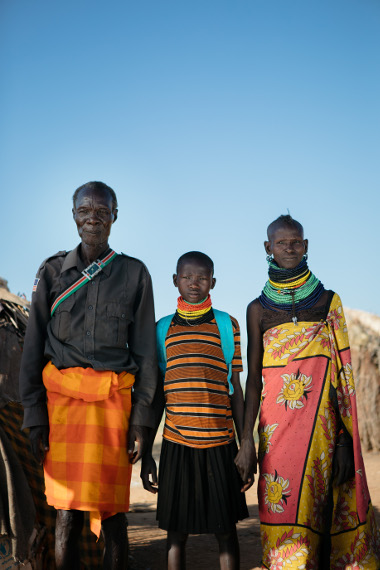
12-year-old Rebecca Atubo’s (middle) parents David Edapal (left) and Aseken Namasi sent their daughter to school. The shift from nomadic culture to a view of life that values education is seen strong in Turkana.
Almost all inhabitants of Turkana are pastoralists. Boys are brought up to raise cattle, and girls are expected to add to the family’s wealth by marrying. The dowry goes to the entire extended family.
Child marriage is still common. Because of the expectations of the traditional lifestyle, pastoralist people used to have little respect for education.
When Alice Loro Lele got to school age, her mother wanted her to go to school, but her father resisted. In anger, her father threw them both out, and with no livestock, they were destitute.
After comprehensive education, Alice could not afford to go to high school. Today, Alice is a 20-year-old mother of three, and lives in a hut in Lokichar with her mother.
”I married at 15, because I thought my husband would take care of us. I was foolish, and I didn’t know much about anything,” Alice says, clearly upset.
Her husband never paid dowry, which is another example of the plight of the nomadic people. As a gifted student, Alice got a job as a preschool teacher. She also started a general store. But her husband kept all the profits and started drinking. Alice gave birth to two children, but her husband did not care about them.
”When I was pregnant for the third time, my husband was going to get a second wife. I left him and moved back in with my mother,” Alice says.
Turkana lives under the poverty line
Places like Turkana are far from the reality of the capital Nairobi. Kenyan economy has grown at a rapid pace. Nairobi is teeming with skyscrapers, technology, and innovative mobile phone applications. In Turkana, most people live in villages with no electricity or running water.
In Nairobi, 22 percent of the people live under the poverty line, while in Turkana, the number is 88 percent. The disparity is largely due to education. In Nairobi, almost everyone has at least completed comprehensive school – in Turkana, 18 percent.
Pastoralists are moving into towns of Turkana with hope of work, but few of them even know how to read.
”We encourage families to send their children to school. More and more people see this as a solution in the long term,” says FCA education coordinator Miriam Atonia.
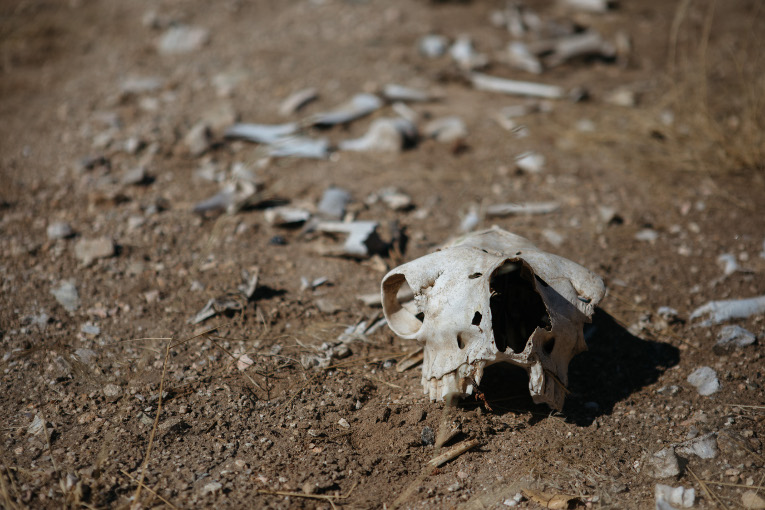
Hundreds of thousands of animals died during the drought of 2017. The drought had catastrophic repercussions for the nomadic people whose livelihood depends on raising cattle.
Things are moving in the right direction. Today, over half of the school-aged children and young people in Turkana go to school. Almost 27,000 started school in the poorest counties in Kenya in FCA projects during 2018.
Alice was offered a scholarship to study at a high school in Lokichar. She also thanks her mother for her support: mother looks after Alice’s children while she is at school.
”My heart breaks because I see my children so rarely. But we have to make some sacrifices; if we’re idle, we can’t improve our situation,” she says.
”I want to become a teacher because I want to encourage girls to go to school. I can give them the kind of advice I needed myself.”
It is hard to communicate the benefits of education to parents who have led a nomadic life. Edapal and Namasi did not go to school, but after a great deal of consideration, they decided to send their daughter Rebecca off to get an education.
”I have seen how the people of my generation, those who went to school, are succeeding. If we had received an education, we would be sleeping on mattresses, and our hut would have a tin roof instead of cloth,” he muses.
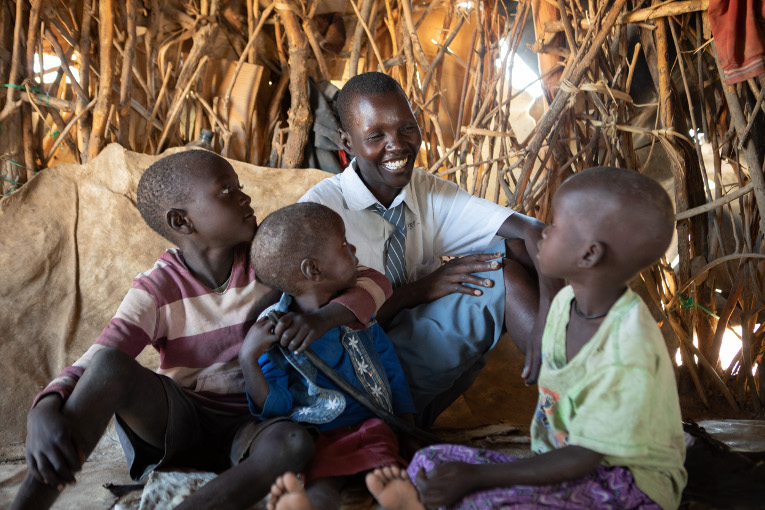
Alice Loro Lele (left) goes to school and takes care of her three children. She happy, that she decided to return to school.
A woman with an education is independent
After letting the goats out to pasture, it only takes Rebecca a few minutes of walking to get to the first lesson of the day. Edapal compares education to marriage – Rebecca is now married to school. An educated woman does not need to depend on others. She can make her own decisions regarding marriage once she is has finished her schooling.
Edapal feels proud when after her school day, Rebecca tells him about what she has learned.
”I hope Rebecca finds herself a job she likes, and God willing, can even help her parents in the future. Education provides lots of opportunities which I can’t even imagine.”
Text: Erik Nyström, Translation: Elina Vuolteenaho, Photos: Tatu Blomqvist / Ville Nykänen
Take part in the Common Responsibility Campaign at yhteisvastuu.fi, In addition, see the touching TV documentaries on the Yle channels starting from the beginning of February.
The members of ACT Alliance, the world’s largest humanitarian and development movement of faith-based organisations, gathered this week for its General Assembly in Uppsala, Sweden.
The members approved ACT Alliance’s new strategy for the years 2019–2026: Putting People First, focusing on a holistic and integrated response in humanitarian, development and advocacy work.
“ACT Alliance and its members included for the first time gender justice as a programme area in the Global Strategy. This makes ACT’s commitment to gender justice and equity even stronger than before,” says Jouni Hemberg, Executive Director of Finn Church Aid (FCA).
The Governing Board approved the ACT Alliance Gender Justice Policy already in 2017.
With 150 members and operations in 125 countries, ACT Alliance’s members stress that ACT plays a major role in tackling challenges around issues like climate change, conflicts, refugees, migration, extreme poverty and more.
“On a grassroots level, ACT members often have the best access, chances for cooperation and implementation of projects. However, without the coordination of our actions, the impact of our work would be more limited”, Hemberg says.
Youth participation took a leap forward
The General Assembly also invited its member organisations’ youth representatives for a two-day pre-assembly meeting. Sophon Chau from the youth network Changemaker Cambodia and FCA thought this was a great opportunity to meet face to face with youth from around the globe.
“It was also inspiring to see their commitment to making change in their communities and to exchange ideas with them on youth participation in varying contexts”, says Chau.
“We feel that the General Assembly took us very seriously and was committed to include youth in decision-making processes. There were some bureaucratic hurdles but the spirit of the assembly was unanimously supportive for our cause and we felt welcomed, listened to and wholeheartedly supported by the Alliance,” say both Chau and Jaro Karkinen, Chair of Changemaker Finland.
The most important message of the youth delegates was asking for two chairs for the youth in the governing board of the ACT Alliance to ensure access to decision-making.
“It is said that the youth are the future, but we also want to be part of today,” say Chau and Karkinen.
According to FCA’s report Youth on the Move, youth represent 1.8 billion opportunities.
“Young people have the energy and the ideas. To include us is a very easy thing to do: just allow us to participate and listen what we have to say. We want to be the Changemakers of our world.”
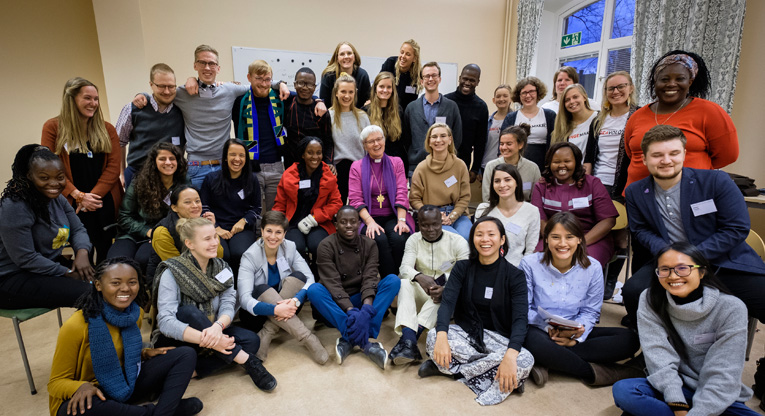
ACT Youth Community of Practice Pre-Assembly meeting in Uppsala, Sweden on October 26-27 2018. Photo: Simon Chambers/ACT.
Text: Minna Elo
Bunu Rai, 20, from Nepal, is training in Automobile Mechanics. There are very few female workers in the automobile industry in Nepal. But this is about to change.
“I want to change the perception of the society and the people. Women can do this work, even though it has been perceived to be only for men,” Bunu Rai says.
Finn Church Aid’s local partner organisation UCEP Nepal’s Sano Thimi Technical School in Bhaktapur near the capital Kathmandu has started to offer non-traditional vocational education for young women.
Rai has been learning a lot at the school and enjoyed her studies very much.
“When I’ve been studying and working with men, one thing I have learned is courage. I do not feel any awkwardness, I’m very happy. We students help each other.”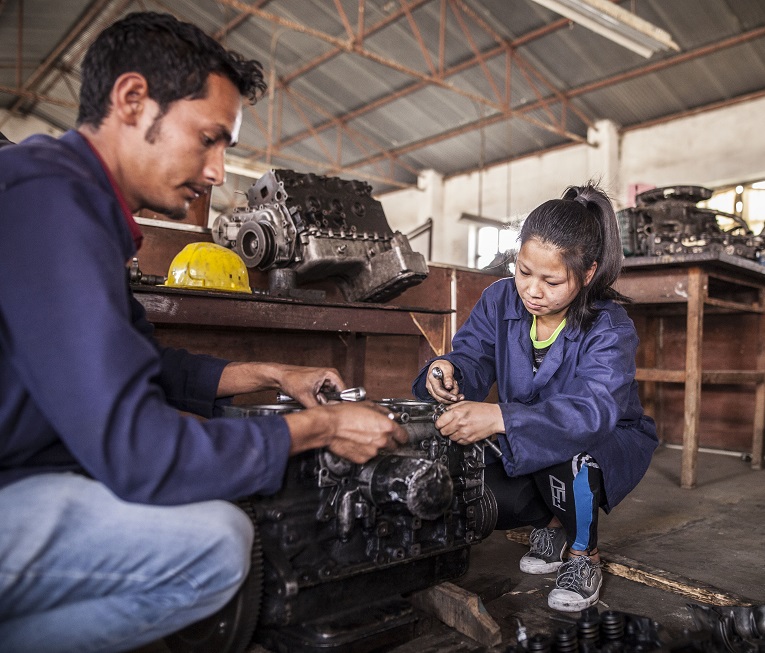
”Our society is patriarchal. I want change! I want women to be treated equally and have an equal place in the society.”
Rai says that in the past there was discrimination between daughters and sons in Nepali families. Often boys went to school and girls stayed home doing housework.
However, Rai’s parents always treated her and her sister and brother equally.
“My father used to work as a school helper. Perhaps he learned his good thinking partly from the school.”
At the Sano Thimi Technical School there are students from around the country, many living at the school hostel. Underprivileged youths such as youths from dalit or ex-bonder labour groups and youths from low economic background can get a scholarship for their studies.
After graduating, Bunu Rai wants to find a job or open her own workshop. In Sano Thimi, the training is followed by support to job placement or self-employment.
Text: Ulla Kärki
Photos: Veera Pitkänen







